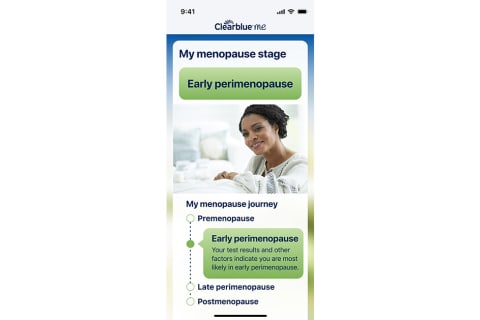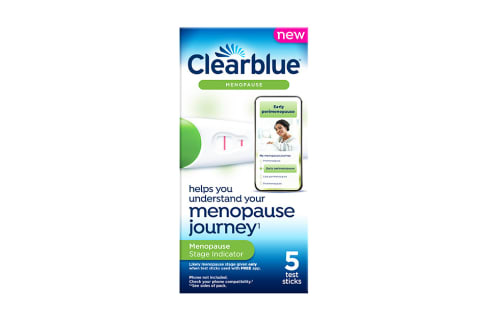Advertisement
Clearblue Launched An At-Home Menopause Test: What It Is & How To Use It


Believe it or not, detecting pregnancy hasn't always been as easy as peeing on a stick. Before the release of Warner-Chilcott's "early pregnancy test" (e.p.t.) in 1976, it was impossible to test for pregnancy from your own home. These days, it's hard to imagine life without the convenience and privacy of these tests.
Nearly 50 years later, menopause testing could finally become just as straightforward—thanks to a Clearblue product. To come, what this device entails and why it's such a significant milestone.
Clearblue launched an at-home menopause test
Clearblue launched the first ever at-home product that can indicate a woman's current stage of menopause via a follicle-stimulating hormone (FSH) test, and it's called the Clearblue Menopause Stage Indicator. The test isn't quite as simple as a pregnancy test, but it's as close as possible given the complexity of menopause stages.
It will be available in major drugstore retailers and online for $20 (though the price may vary depending on the retailer).
Up until now, it's been difficult for women to know what stage of menopause they're in. Figuring out whether you're in premenopause, early perimenopause, late perimenopause, or postmenopause has been a guessing game of matching your symptoms to information found online. While some doctors offer menopause tests, they aren't always available.
"The menopausal transition can be a 'black box' for many women, associated with vague emotional, physical, and mental changes that could be overlooked during our busy lives," explains reproductive endocrinologist on the Clearblue Advisory Board Suruchi Thakore, M.D., OB/GYN.
While hot flashes and night sweats may be the two most common symptoms of menopause, they're only a small part of the picture. In fact, there are over 30 symptoms that stem from these hormonal shifts, including things like brain fog, libido shifts, anxiety, joint pain, bloating, insomnia, and many more—hence, why misdiagnoses happen often.
Doctors may see these experiences, especially those pertaining to mental health like anxiety and depression, as diagnoses rather than symptoms, which may lead to putting a Band-Aid over the concern but never truly addressing the root cause.
However, Clearblue's test aims to tell women whether their symptoms are attributable to hormonal shifts or other factors, giving them a head start on effective treatment.
Up until now, it's been difficult for women to know what stage of menopause they're in
This is similar to the eye-opening experience of learning about your typical cycle phases after starting your period—gaining reassurance that those short but strong mood swings you feel before your period are normal. Or that your boost of energy during the follicular phase line up with your hormone fluctuations.
"This product empowers women by helping them understand the potential cause of these symptoms and start the important conversation with their health care providers for management," Thakore says.
The test also encourages women to track their symptoms, helping them determine what lifestyle changes could help improve their quality of life. Just as certain foods or exercise regimens may be more helpful during one cycle phase than the next, the same is true for menopause stages.
Who should take the test?
Due to the social stigmas and lack of education around menopause, many people think this process begins when you're 50 or older—and for some women, that's true. However, perimenopause can begin as early as mid-30s.
A few common symptoms of perimenopause include:
- Hot flashes and night sweats
- Irregular periods
- Mood changes
- Painful sex
So if any of these apply to you or you suspect you may be entering menopause for any other reason, taking this at-home test is a great first step.
How it works
Given the hormone fluctuations in the menstrual cycle, you'll need to use this test to collect five urine samples over the course of 10 days. This cadence helps ensure any natural imbalances are accounted for to improve the accuracy of the results.

Heads up: The results of this test aren't just yes or no like pregnancy tests. Instead, the test will tell you if you're in premenopause, early perimenopause, late perimenopause, or postmenopause—and women can use the accompanying app to better understand their results.
Once you have your results from the at-home test, you can print out the report (or download it to your phone) to share with your health care provider. They can then confirm your menopause stage via further testing.
One of the reasons in-office menopause testing is so difficult is that hormones naturally fluctuate throughout the cycle, so testing one random day of the month is like looking at one piece of a puzzle. This test fills the gap by taking five different measurements to account for natural fluctuations and tracking your symptoms, which is a huge part of menopause diagnosis in the office as well.
How to take the Clearblue Menopause Stage Indicator test
- Get the test & app: Purchase the test from a major retailer like Rite Aid or Walgreens and download the Clearblue me app (available on iOS and Android).
- Make your account: Create your account in the app and follow the in-app instructions.
- Take the tests: Take 5 FSH (follicle-stimulating hormone) urine tests over the course of 10 days—one test every other day. The app combines your FSH results with cycle history and age to determine your likely menopause stage.
- Get your report: Generate your personalized report to share with your health care professional.
Who shouldn't take it?
While this test is great for many people, it's not fit for everyone. If any of the below apply to you, then you may want to skip it for now or at least consult with your health care provider first to ensure you'll receive accurate results:
- You are on hormonal birth control
- You are currently undergoing hormone therapy
- You have PCOS or other hormone-related disorders
- You are currently pregnant or breastfeeding
- You are taking medication that affects your FSH
- You had surgery that affected your cycle
If you're unsure whether the test is right for you, consult your health care provider first.
Why this could be a big deal for women's health care
It's pretty crazy to think that until the National Institutes of Health (NIH) Revitalization Act of 1993, women were not required to be included in clinical trialsfor health testing. Some restrictions were motivated by protecting the potential of a fetus even if women were not pregnant; others related to the risk of complicating data with women's fluctuating hormones.
Luckily, women's health research is slowly but surely advancing. In recent years, there's been more light thrown on women's top health concerns, ranging from birth control side effects to the nuances of Alzheimer's risk in women1, effective postpartum depression treatment2 options, and so much more. Now, menopause is finally starting to gain more attention too.
This test serves as a useful tool to help women navigate menopause—a stage of life that's definitely not discussed as often or as openly as it should be, causing confusion, shame, and fear around normal bodily function.
Given that more than a million women in the U.S. experience menopause each year, it's about time we start really talking about menopause both in medical settings and social discourse.
For those who have spent weeks, months, or years on uneven ground feeling as if they're navigating menopause in the dark, this test may be the first step to clarity and comfort.
The takeaway
Clearblue's menopause phase detector test that can be taken at home. The results can be printed out or sent to your health care professional to support more productive conversations around menopause. Apart from putting power in the hands of women, this test will hopefully shed light on the nuances of menopause and help many people navigate it more comfortably and confidently.
